BBC: Organisational Behaviour and Management Report
VerifiedAdded on 2020/06/04
|17
|5200
|59
Report
AI Summary
This report provides an in-depth analysis of organisational behaviour within the British Broadcasting Corporation (BBC). It begins by applying Handy's cultural typology to understand the internal dynamics of the company, exploring power, task, person, and role cultures. The report then examines the impact of culture, power, and politics on employee behaviour within the BBC, highlighting challenges and potential solutions. Furthermore, it delves into motivation theories, including Maslow's hierarchy of needs and Herzberg's two-factor theory, and discusses how these theories can be applied to improve team effectiveness. The report also identifies and explains different types of teams within the BBC, proposing methods for fostering effective teamwork. Finally, it explores organisational theories for enhancing team performance and addresses potential barriers to success. The report concludes by summarizing the key findings and recommendations for the BBC.
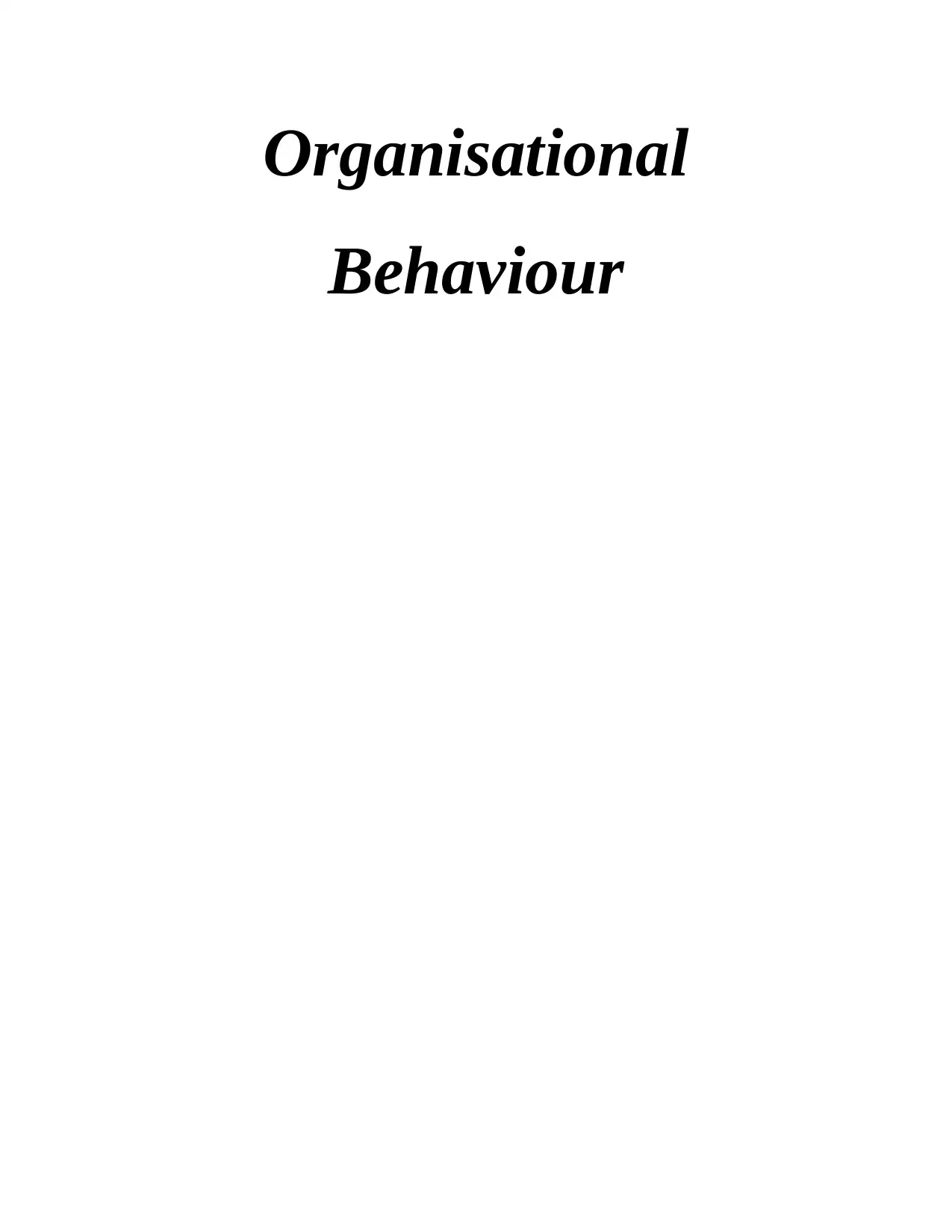
Organisational
Behaviour
Behaviour
Paraphrase This Document
Need a fresh take? Get an instant paraphrase of this document with our AI Paraphraser
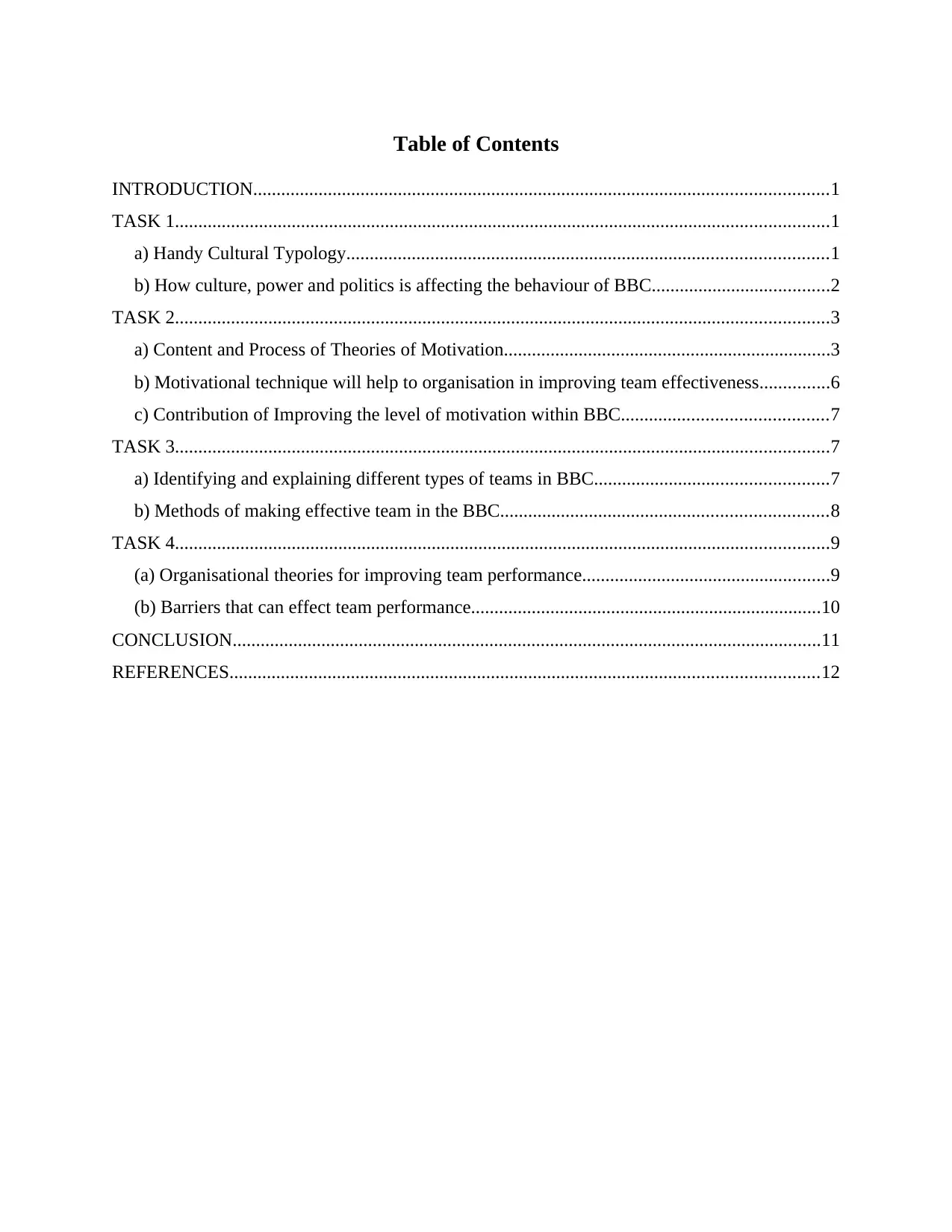
Table of Contents
INTRODUCTION...........................................................................................................................1
TASK 1............................................................................................................................................1
a) Handy Cultural Typology.......................................................................................................1
b) How culture, power and politics is affecting the behaviour of BBC......................................2
TASK 2............................................................................................................................................3
a) Content and Process of Theories of Motivation......................................................................3
b) Motivational technique will help to organisation in improving team effectiveness...............6
c) Contribution of Improving the level of motivation within BBC............................................7
TASK 3............................................................................................................................................7
a) Identifying and explaining different types of teams in BBC..................................................7
b) Methods of making effective team in the BBC......................................................................8
TASK 4............................................................................................................................................9
(a) Organisational theories for improving team performance.....................................................9
(b) Barriers that can effect team performance...........................................................................10
CONCLUSION..............................................................................................................................11
REFERENCES..............................................................................................................................12
INTRODUCTION...........................................................................................................................1
TASK 1............................................................................................................................................1
a) Handy Cultural Typology.......................................................................................................1
b) How culture, power and politics is affecting the behaviour of BBC......................................2
TASK 2............................................................................................................................................3
a) Content and Process of Theories of Motivation......................................................................3
b) Motivational technique will help to organisation in improving team effectiveness...............6
c) Contribution of Improving the level of motivation within BBC............................................7
TASK 3............................................................................................................................................7
a) Identifying and explaining different types of teams in BBC..................................................7
b) Methods of making effective team in the BBC......................................................................8
TASK 4............................................................................................................................................9
(a) Organisational theories for improving team performance.....................................................9
(b) Barriers that can effect team performance...........................................................................10
CONCLUSION..............................................................................................................................11
REFERENCES..............................................................................................................................12

⊘ This is a preview!⊘
Do you want full access?
Subscribe today to unlock all pages.

Trusted by 1+ million students worldwide
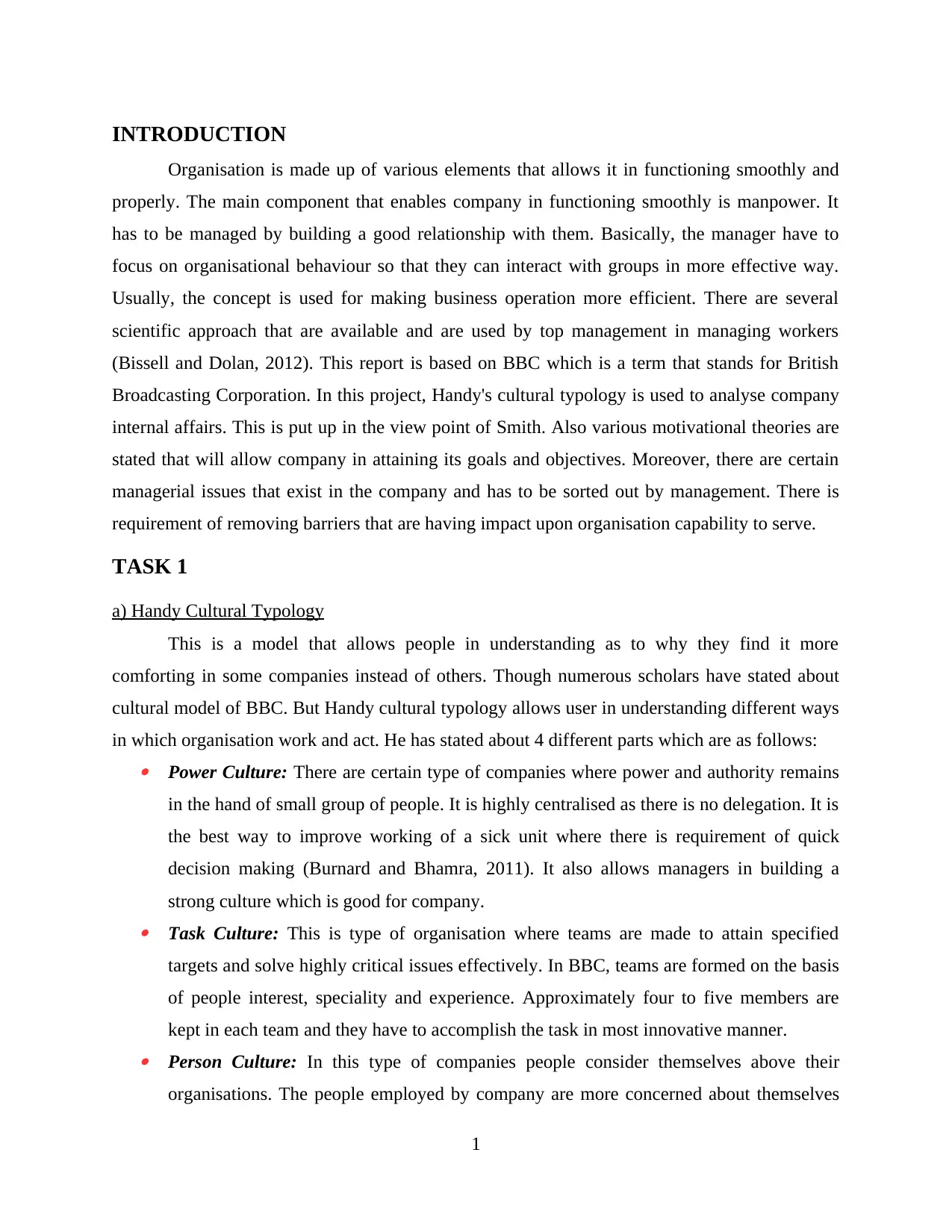
INTRODUCTION
Organisation is made up of various elements that allows it in functioning smoothly and
properly. The main component that enables company in functioning smoothly is manpower. It
has to be managed by building a good relationship with them. Basically, the manager have to
focus on organisational behaviour so that they can interact with groups in more effective way.
Usually, the concept is used for making business operation more efficient. There are several
scientific approach that are available and are used by top management in managing workers
(Bissell and Dolan, 2012). This report is based on BBC which is a term that stands for British
Broadcasting Corporation. In this project, Handy's cultural typology is used to analyse company
internal affairs. This is put up in the view point of Smith. Also various motivational theories are
stated that will allow company in attaining its goals and objectives. Moreover, there are certain
managerial issues that exist in the company and has to be sorted out by management. There is
requirement of removing barriers that are having impact upon organisation capability to serve.
TASK 1
a) Handy Cultural Typology
This is a model that allows people in understanding as to why they find it more
comforting in some companies instead of others. Though numerous scholars have stated about
cultural model of BBC. But Handy cultural typology allows user in understanding different ways
in which organisation work and act. He has stated about 4 different parts which are as follows: Power Culture: There are certain type of companies where power and authority remains
in the hand of small group of people. It is highly centralised as there is no delegation. It is
the best way to improve working of a sick unit where there is requirement of quick
decision making (Burnard and Bhamra, 2011). It also allows managers in building a
strong culture which is good for company. Task Culture: This is type of organisation where teams are made to attain specified
targets and solve highly critical issues effectively. In BBC, teams are formed on the basis
of people interest, speciality and experience. Approximately four to five members are
kept in each team and they have to accomplish the task in most innovative manner. Person Culture: In this type of companies people consider themselves above their
organisations. The people employed by company are more concerned about themselves
1
Organisation is made up of various elements that allows it in functioning smoothly and
properly. The main component that enables company in functioning smoothly is manpower. It
has to be managed by building a good relationship with them. Basically, the manager have to
focus on organisational behaviour so that they can interact with groups in more effective way.
Usually, the concept is used for making business operation more efficient. There are several
scientific approach that are available and are used by top management in managing workers
(Bissell and Dolan, 2012). This report is based on BBC which is a term that stands for British
Broadcasting Corporation. In this project, Handy's cultural typology is used to analyse company
internal affairs. This is put up in the view point of Smith. Also various motivational theories are
stated that will allow company in attaining its goals and objectives. Moreover, there are certain
managerial issues that exist in the company and has to be sorted out by management. There is
requirement of removing barriers that are having impact upon organisation capability to serve.
TASK 1
a) Handy Cultural Typology
This is a model that allows people in understanding as to why they find it more
comforting in some companies instead of others. Though numerous scholars have stated about
cultural model of BBC. But Handy cultural typology allows user in understanding different ways
in which organisation work and act. He has stated about 4 different parts which are as follows: Power Culture: There are certain type of companies where power and authority remains
in the hand of small group of people. It is highly centralised as there is no delegation. It is
the best way to improve working of a sick unit where there is requirement of quick
decision making (Burnard and Bhamra, 2011). It also allows managers in building a
strong culture which is good for company. Task Culture: This is type of organisation where teams are made to attain specified
targets and solve highly critical issues effectively. In BBC, teams are formed on the basis
of people interest, speciality and experience. Approximately four to five members are
kept in each team and they have to accomplish the task in most innovative manner. Person Culture: In this type of companies people consider themselves above their
organisations. The people employed by company are more concerned about themselves
1
Paraphrase This Document
Need a fresh take? Get an instant paraphrase of this document with our AI Paraphraser
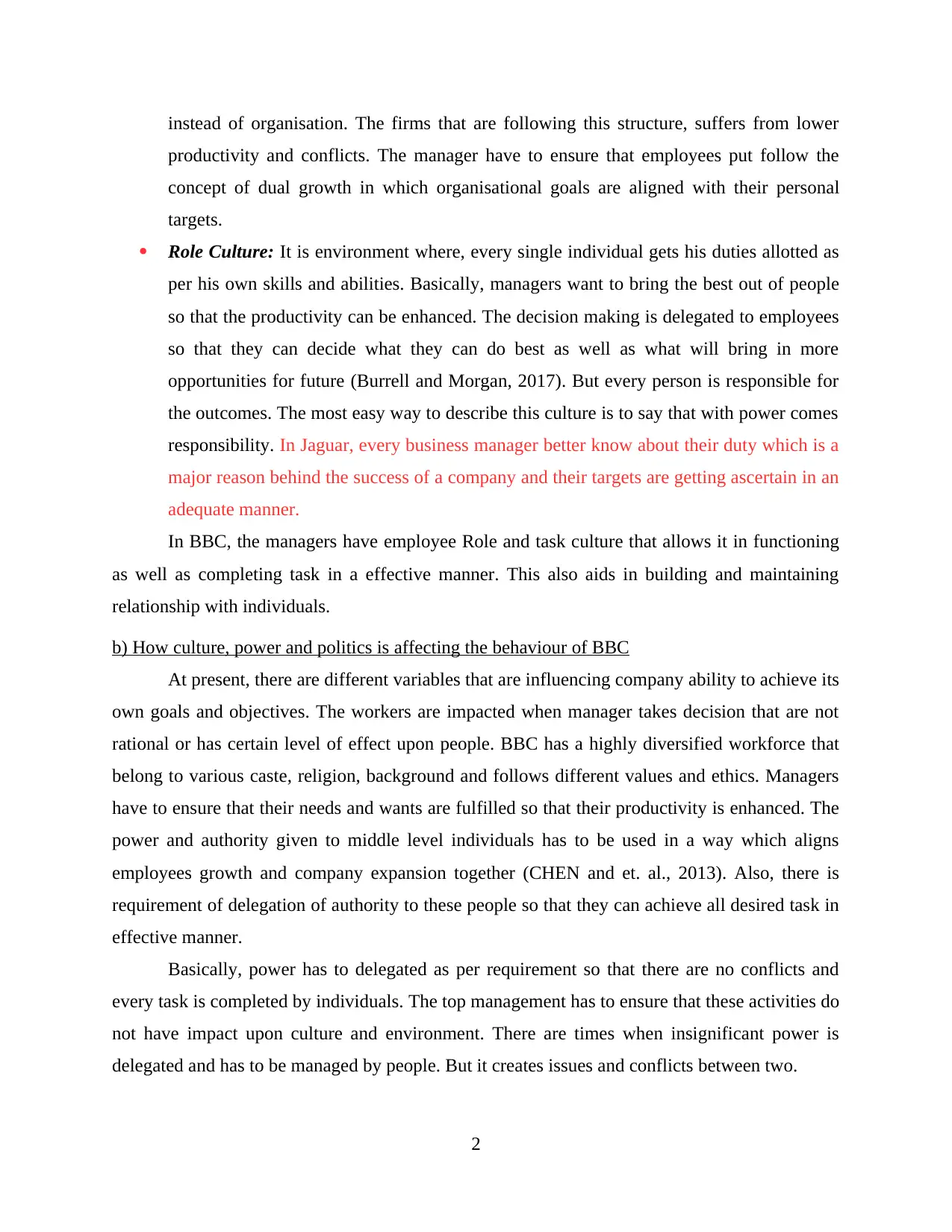
instead of organisation. The firms that are following this structure, suffers from lower
productivity and conflicts. The manager have to ensure that employees put follow the
concept of dual growth in which organisational goals are aligned with their personal
targets.
Role Culture: It is environment where, every single individual gets his duties allotted as
per his own skills and abilities. Basically, managers want to bring the best out of people
so that the productivity can be enhanced. The decision making is delegated to employees
so that they can decide what they can do best as well as what will bring in more
opportunities for future (Burrell and Morgan, 2017). But every person is responsible for
the outcomes. The most easy way to describe this culture is to say that with power comes
responsibility. In Jaguar, every business manager better know about their duty which is a
major reason behind the success of a company and their targets are getting ascertain in an
adequate manner.
In BBC, the managers have employee Role and task culture that allows it in functioning
as well as completing task in a effective manner. This also aids in building and maintaining
relationship with individuals.
b) How culture, power and politics is affecting the behaviour of BBC
At present, there are different variables that are influencing company ability to achieve its
own goals and objectives. The workers are impacted when manager takes decision that are not
rational or has certain level of effect upon people. BBC has a highly diversified workforce that
belong to various caste, religion, background and follows different values and ethics. Managers
have to ensure that their needs and wants are fulfilled so that their productivity is enhanced. The
power and authority given to middle level individuals has to be used in a way which aligns
employees growth and company expansion together (CHEN and et. al., 2013). Also, there is
requirement of delegation of authority to these people so that they can achieve all desired task in
effective manner.
Basically, power has to delegated as per requirement so that there are no conflicts and
every task is completed by individuals. The top management has to ensure that these activities do
not have impact upon culture and environment. There are times when insignificant power is
delegated and has to be managed by people. But it creates issues and conflicts between two.
2
productivity and conflicts. The manager have to ensure that employees put follow the
concept of dual growth in which organisational goals are aligned with their personal
targets.
Role Culture: It is environment where, every single individual gets his duties allotted as
per his own skills and abilities. Basically, managers want to bring the best out of people
so that the productivity can be enhanced. The decision making is delegated to employees
so that they can decide what they can do best as well as what will bring in more
opportunities for future (Burrell and Morgan, 2017). But every person is responsible for
the outcomes. The most easy way to describe this culture is to say that with power comes
responsibility. In Jaguar, every business manager better know about their duty which is a
major reason behind the success of a company and their targets are getting ascertain in an
adequate manner.
In BBC, the managers have employee Role and task culture that allows it in functioning
as well as completing task in a effective manner. This also aids in building and maintaining
relationship with individuals.
b) How culture, power and politics is affecting the behaviour of BBC
At present, there are different variables that are influencing company ability to achieve its
own goals and objectives. The workers are impacted when manager takes decision that are not
rational or has certain level of effect upon people. BBC has a highly diversified workforce that
belong to various caste, religion, background and follows different values and ethics. Managers
have to ensure that their needs and wants are fulfilled so that their productivity is enhanced. The
power and authority given to middle level individuals has to be used in a way which aligns
employees growth and company expansion together (CHEN and et. al., 2013). Also, there is
requirement of delegation of authority to these people so that they can achieve all desired task in
effective manner.
Basically, power has to delegated as per requirement so that there are no conflicts and
every task is completed by individuals. The top management has to ensure that these activities do
not have impact upon culture and environment. There are times when insignificant power is
delegated and has to be managed by people. But it creates issues and conflicts between two.
2
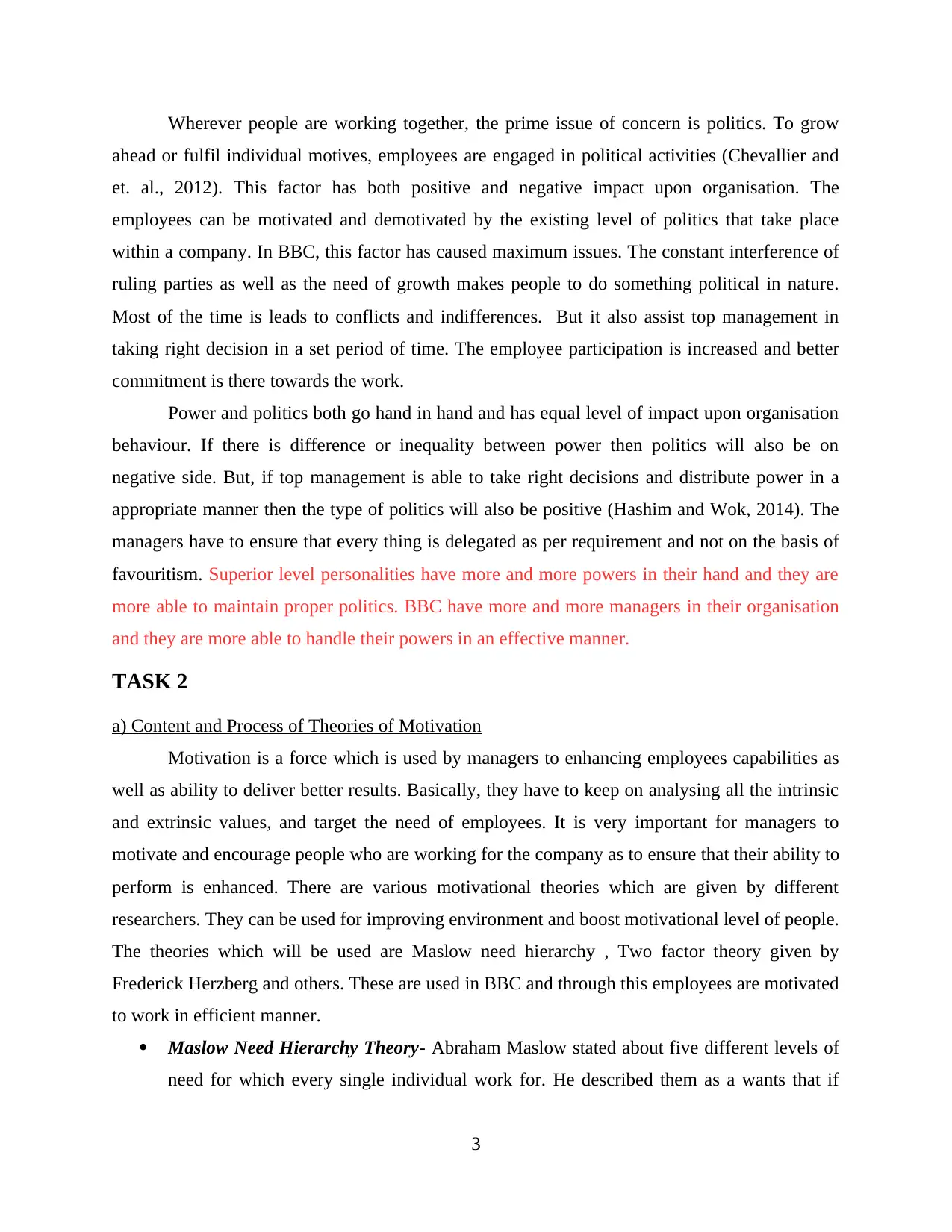
Wherever people are working together, the prime issue of concern is politics. To grow
ahead or fulfil individual motives, employees are engaged in political activities (Chevallier and
et. al., 2012). This factor has both positive and negative impact upon organisation. The
employees can be motivated and demotivated by the existing level of politics that take place
within a company. In BBC, this factor has caused maximum issues. The constant interference of
ruling parties as well as the need of growth makes people to do something political in nature.
Most of the time is leads to conflicts and indifferences. But it also assist top management in
taking right decision in a set period of time. The employee participation is increased and better
commitment is there towards the work.
Power and politics both go hand in hand and has equal level of impact upon organisation
behaviour. If there is difference or inequality between power then politics will also be on
negative side. But, if top management is able to take right decisions and distribute power in a
appropriate manner then the type of politics will also be positive (Hashim and Wok, 2014). The
managers have to ensure that every thing is delegated as per requirement and not on the basis of
favouritism. Superior level personalities have more and more powers in their hand and they are
more able to maintain proper politics. BBC have more and more managers in their organisation
and they are more able to handle their powers in an effective manner.
TASK 2
a) Content and Process of Theories of Motivation
Motivation is a force which is used by managers to enhancing employees capabilities as
well as ability to deliver better results. Basically, they have to keep on analysing all the intrinsic
and extrinsic values, and target the need of employees. It is very important for managers to
motivate and encourage people who are working for the company as to ensure that their ability to
perform is enhanced. There are various motivational theories which are given by different
researchers. They can be used for improving environment and boost motivational level of people.
The theories which will be used are Maslow need hierarchy , Two factor theory given by
Frederick Herzberg and others. These are used in BBC and through this employees are motivated
to work in efficient manner.
Maslow Need Hierarchy Theory- Abraham Maslow stated about five different levels of
need for which every single individual work for. He described them as a wants that if
3
ahead or fulfil individual motives, employees are engaged in political activities (Chevallier and
et. al., 2012). This factor has both positive and negative impact upon organisation. The
employees can be motivated and demotivated by the existing level of politics that take place
within a company. In BBC, this factor has caused maximum issues. The constant interference of
ruling parties as well as the need of growth makes people to do something political in nature.
Most of the time is leads to conflicts and indifferences. But it also assist top management in
taking right decision in a set period of time. The employee participation is increased and better
commitment is there towards the work.
Power and politics both go hand in hand and has equal level of impact upon organisation
behaviour. If there is difference or inequality between power then politics will also be on
negative side. But, if top management is able to take right decisions and distribute power in a
appropriate manner then the type of politics will also be positive (Hashim and Wok, 2014). The
managers have to ensure that every thing is delegated as per requirement and not on the basis of
favouritism. Superior level personalities have more and more powers in their hand and they are
more able to maintain proper politics. BBC have more and more managers in their organisation
and they are more able to handle their powers in an effective manner.
TASK 2
a) Content and Process of Theories of Motivation
Motivation is a force which is used by managers to enhancing employees capabilities as
well as ability to deliver better results. Basically, they have to keep on analysing all the intrinsic
and extrinsic values, and target the need of employees. It is very important for managers to
motivate and encourage people who are working for the company as to ensure that their ability to
perform is enhanced. There are various motivational theories which are given by different
researchers. They can be used for improving environment and boost motivational level of people.
The theories which will be used are Maslow need hierarchy , Two factor theory given by
Frederick Herzberg and others. These are used in BBC and through this employees are motivated
to work in efficient manner.
Maslow Need Hierarchy Theory- Abraham Maslow stated about five different levels of
need for which every single individual work for. He described them as a wants that if
3
⊘ This is a preview!⊘
Do you want full access?
Subscribe today to unlock all pages.

Trusted by 1+ million students worldwide
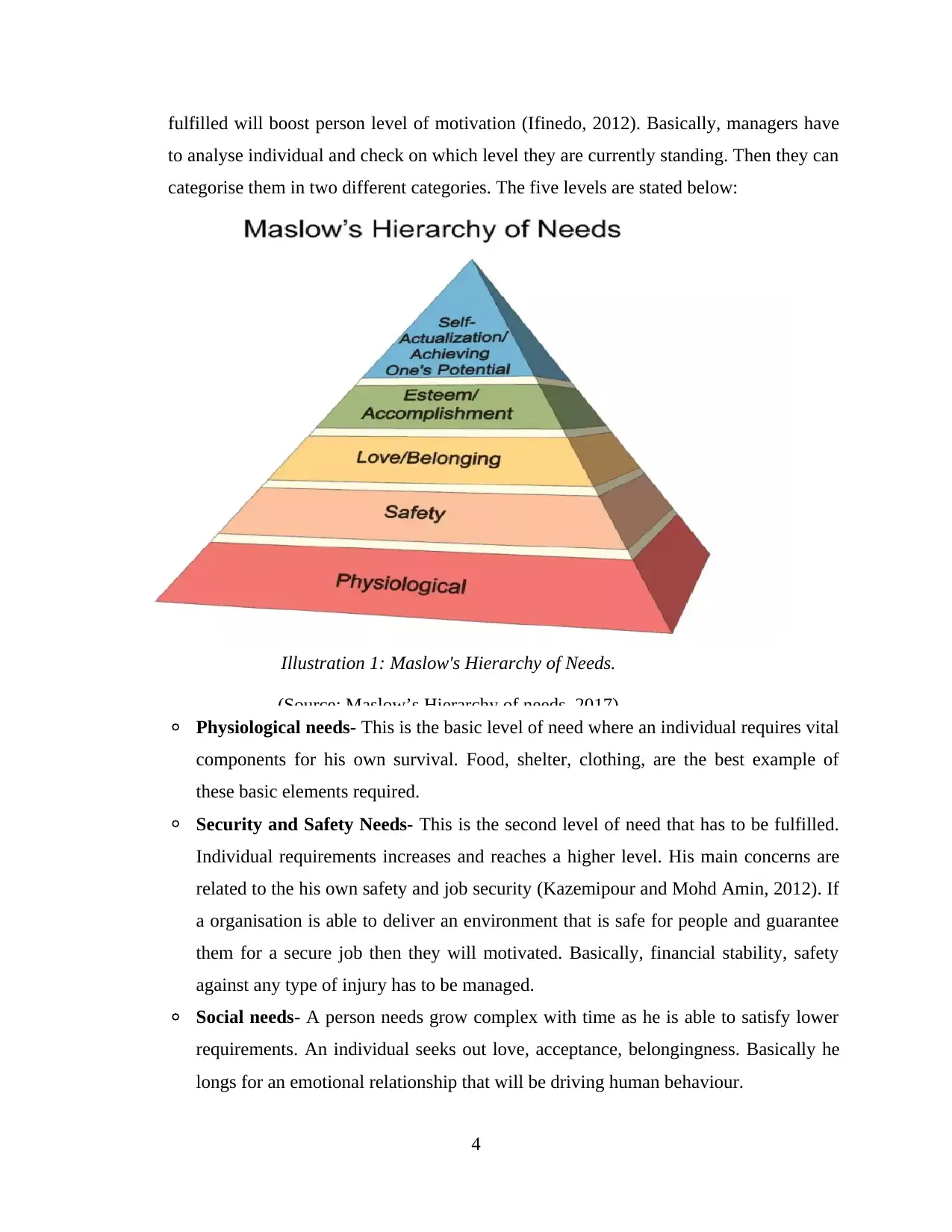
fulfilled will boost person level of motivation (Ifinedo, 2012). Basically, managers have
to analyse individual and check on which level they are currently standing. Then they can
categorise them in two different categories. The five levels are stated below:
Illustration 1: Maslow's Hierarchy of Needs.
(Source: Maslow’s Hierarchy of needs, 2017)
◦ Physiological needs- This is the basic level of need where an individual requires vital
components for his own survival. Food, shelter, clothing, are the best example of
these basic elements required.
◦ Security and Safety Needs- This is the second level of need that has to be fulfilled.
Individual requirements increases and reaches a higher level. His main concerns are
related to the his own safety and job security (Kazemipour and Mohd Amin, 2012). If
a organisation is able to deliver an environment that is safe for people and guarantee
them for a secure job then they will motivated. Basically, financial stability, safety
against any type of injury has to be managed.
◦ Social needs- A person needs grow complex with time as he is able to satisfy lower
requirements. An individual seeks out love, acceptance, belongingness. Basically he
longs for an emotional relationship that will be driving human behaviour.
4
to analyse individual and check on which level they are currently standing. Then they can
categorise them in two different categories. The five levels are stated below:
Illustration 1: Maslow's Hierarchy of Needs.
(Source: Maslow’s Hierarchy of needs, 2017)
◦ Physiological needs- This is the basic level of need where an individual requires vital
components for his own survival. Food, shelter, clothing, are the best example of
these basic elements required.
◦ Security and Safety Needs- This is the second level of need that has to be fulfilled.
Individual requirements increases and reaches a higher level. His main concerns are
related to the his own safety and job security (Kazemipour and Mohd Amin, 2012). If
a organisation is able to deliver an environment that is safe for people and guarantee
them for a secure job then they will motivated. Basically, financial stability, safety
against any type of injury has to be managed.
◦ Social needs- A person needs grow complex with time as he is able to satisfy lower
requirements. An individual seeks out love, acceptance, belongingness. Basically he
longs for an emotional relationship that will be driving human behaviour.
4
Paraphrase This Document
Need a fresh take? Get an instant paraphrase of this document with our AI Paraphraser
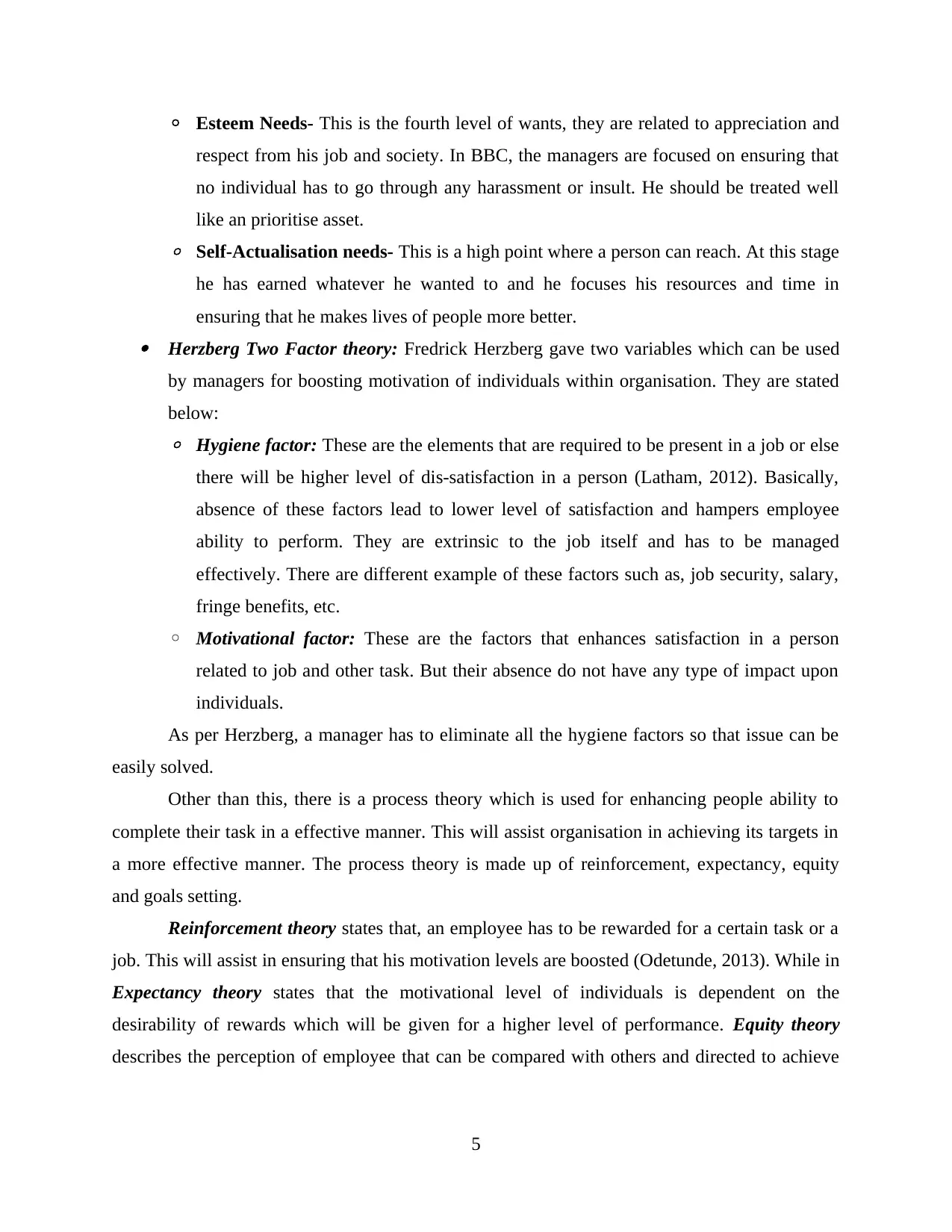
◦ Esteem Needs- This is the fourth level of wants, they are related to appreciation and
respect from his job and society. In BBC, the managers are focused on ensuring that
no individual has to go through any harassment or insult. He should be treated well
like an prioritise asset.
◦ Self-Actualisation needs- This is a high point where a person can reach. At this stage
he has earned whatever he wanted to and he focuses his resources and time in
ensuring that he makes lives of people more better. Herzberg Two Factor theory: Fredrick Herzberg gave two variables which can be used
by managers for boosting motivation of individuals within organisation. They are stated
below:
◦ Hygiene factor: These are the elements that are required to be present in a job or else
there will be higher level of dis-satisfaction in a person (Latham, 2012). Basically,
absence of these factors lead to lower level of satisfaction and hampers employee
ability to perform. They are extrinsic to the job itself and has to be managed
effectively. There are different example of these factors such as, job security, salary,
fringe benefits, etc.
◦ Motivational factor: These are the factors that enhances satisfaction in a person
related to job and other task. But their absence do not have any type of impact upon
individuals.
As per Herzberg, a manager has to eliminate all the hygiene factors so that issue can be
easily solved.
Other than this, there is a process theory which is used for enhancing people ability to
complete their task in a effective manner. This will assist organisation in achieving its targets in
a more effective manner. The process theory is made up of reinforcement, expectancy, equity
and goals setting.
Reinforcement theory states that, an employee has to be rewarded for a certain task or a
job. This will assist in ensuring that his motivation levels are boosted (Odetunde, 2013). While in
Expectancy theory states that the motivational level of individuals is dependent on the
desirability of rewards which will be given for a higher level of performance. Equity theory
describes the perception of employee that can be compared with others and directed to achieve
5
respect from his job and society. In BBC, the managers are focused on ensuring that
no individual has to go through any harassment or insult. He should be treated well
like an prioritise asset.
◦ Self-Actualisation needs- This is a high point where a person can reach. At this stage
he has earned whatever he wanted to and he focuses his resources and time in
ensuring that he makes lives of people more better. Herzberg Two Factor theory: Fredrick Herzberg gave two variables which can be used
by managers for boosting motivation of individuals within organisation. They are stated
below:
◦ Hygiene factor: These are the elements that are required to be present in a job or else
there will be higher level of dis-satisfaction in a person (Latham, 2012). Basically,
absence of these factors lead to lower level of satisfaction and hampers employee
ability to perform. They are extrinsic to the job itself and has to be managed
effectively. There are different example of these factors such as, job security, salary,
fringe benefits, etc.
◦ Motivational factor: These are the factors that enhances satisfaction in a person
related to job and other task. But their absence do not have any type of impact upon
individuals.
As per Herzberg, a manager has to eliminate all the hygiene factors so that issue can be
easily solved.
Other than this, there is a process theory which is used for enhancing people ability to
complete their task in a effective manner. This will assist organisation in achieving its targets in
a more effective manner. The process theory is made up of reinforcement, expectancy, equity
and goals setting.
Reinforcement theory states that, an employee has to be rewarded for a certain task or a
job. This will assist in ensuring that his motivation levels are boosted (Odetunde, 2013). While in
Expectancy theory states that the motivational level of individuals is dependent on the
desirability of rewards which will be given for a higher level of performance. Equity theory
describes the perception of employee that can be compared with others and directed to achieve
5
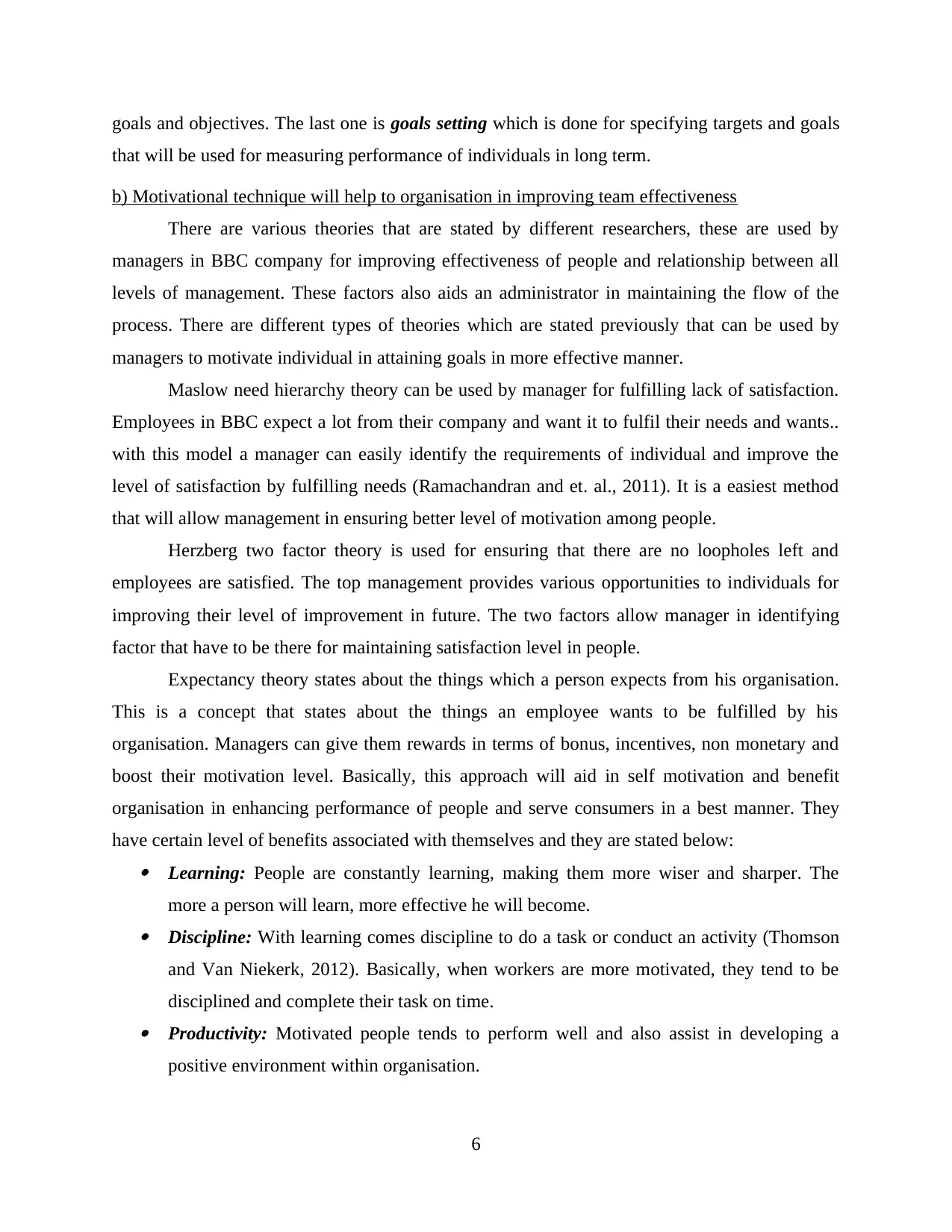
goals and objectives. The last one is goals setting which is done for specifying targets and goals
that will be used for measuring performance of individuals in long term.
b) Motivational technique will help to organisation in improving team effectiveness
There are various theories that are stated by different researchers, these are used by
managers in BBC company for improving effectiveness of people and relationship between all
levels of management. These factors also aids an administrator in maintaining the flow of the
process. There are different types of theories which are stated previously that can be used by
managers to motivate individual in attaining goals in more effective manner.
Maslow need hierarchy theory can be used by manager for fulfilling lack of satisfaction.
Employees in BBC expect a lot from their company and want it to fulfil their needs and wants..
with this model a manager can easily identify the requirements of individual and improve the
level of satisfaction by fulfilling needs (Ramachandran and et. al., 2011). It is a easiest method
that will allow management in ensuring better level of motivation among people.
Herzberg two factor theory is used for ensuring that there are no loopholes left and
employees are satisfied. The top management provides various opportunities to individuals for
improving their level of improvement in future. The two factors allow manager in identifying
factor that have to be there for maintaining satisfaction level in people.
Expectancy theory states about the things which a person expects from his organisation.
This is a concept that states about the things an employee wants to be fulfilled by his
organisation. Managers can give them rewards in terms of bonus, incentives, non monetary and
boost their motivation level. Basically, this approach will aid in self motivation and benefit
organisation in enhancing performance of people and serve consumers in a best manner. They
have certain level of benefits associated with themselves and they are stated below: Learning: People are constantly learning, making them more wiser and sharper. The
more a person will learn, more effective he will become. Discipline: With learning comes discipline to do a task or conduct an activity (Thomson
and Van Niekerk, 2012). Basically, when workers are more motivated, they tend to be
disciplined and complete their task on time. Productivity: Motivated people tends to perform well and also assist in developing a
positive environment within organisation.
6
that will be used for measuring performance of individuals in long term.
b) Motivational technique will help to organisation in improving team effectiveness
There are various theories that are stated by different researchers, these are used by
managers in BBC company for improving effectiveness of people and relationship between all
levels of management. These factors also aids an administrator in maintaining the flow of the
process. There are different types of theories which are stated previously that can be used by
managers to motivate individual in attaining goals in more effective manner.
Maslow need hierarchy theory can be used by manager for fulfilling lack of satisfaction.
Employees in BBC expect a lot from their company and want it to fulfil their needs and wants..
with this model a manager can easily identify the requirements of individual and improve the
level of satisfaction by fulfilling needs (Ramachandran and et. al., 2011). It is a easiest method
that will allow management in ensuring better level of motivation among people.
Herzberg two factor theory is used for ensuring that there are no loopholes left and
employees are satisfied. The top management provides various opportunities to individuals for
improving their level of improvement in future. The two factors allow manager in identifying
factor that have to be there for maintaining satisfaction level in people.
Expectancy theory states about the things which a person expects from his organisation.
This is a concept that states about the things an employee wants to be fulfilled by his
organisation. Managers can give them rewards in terms of bonus, incentives, non monetary and
boost their motivation level. Basically, this approach will aid in self motivation and benefit
organisation in enhancing performance of people and serve consumers in a best manner. They
have certain level of benefits associated with themselves and they are stated below: Learning: People are constantly learning, making them more wiser and sharper. The
more a person will learn, more effective he will become. Discipline: With learning comes discipline to do a task or conduct an activity (Thomson
and Van Niekerk, 2012). Basically, when workers are more motivated, they tend to be
disciplined and complete their task on time. Productivity: Motivated people tends to perform well and also assist in developing a
positive environment within organisation.
6
⊘ This is a preview!⊘
Do you want full access?
Subscribe today to unlock all pages.

Trusted by 1+ million students worldwide
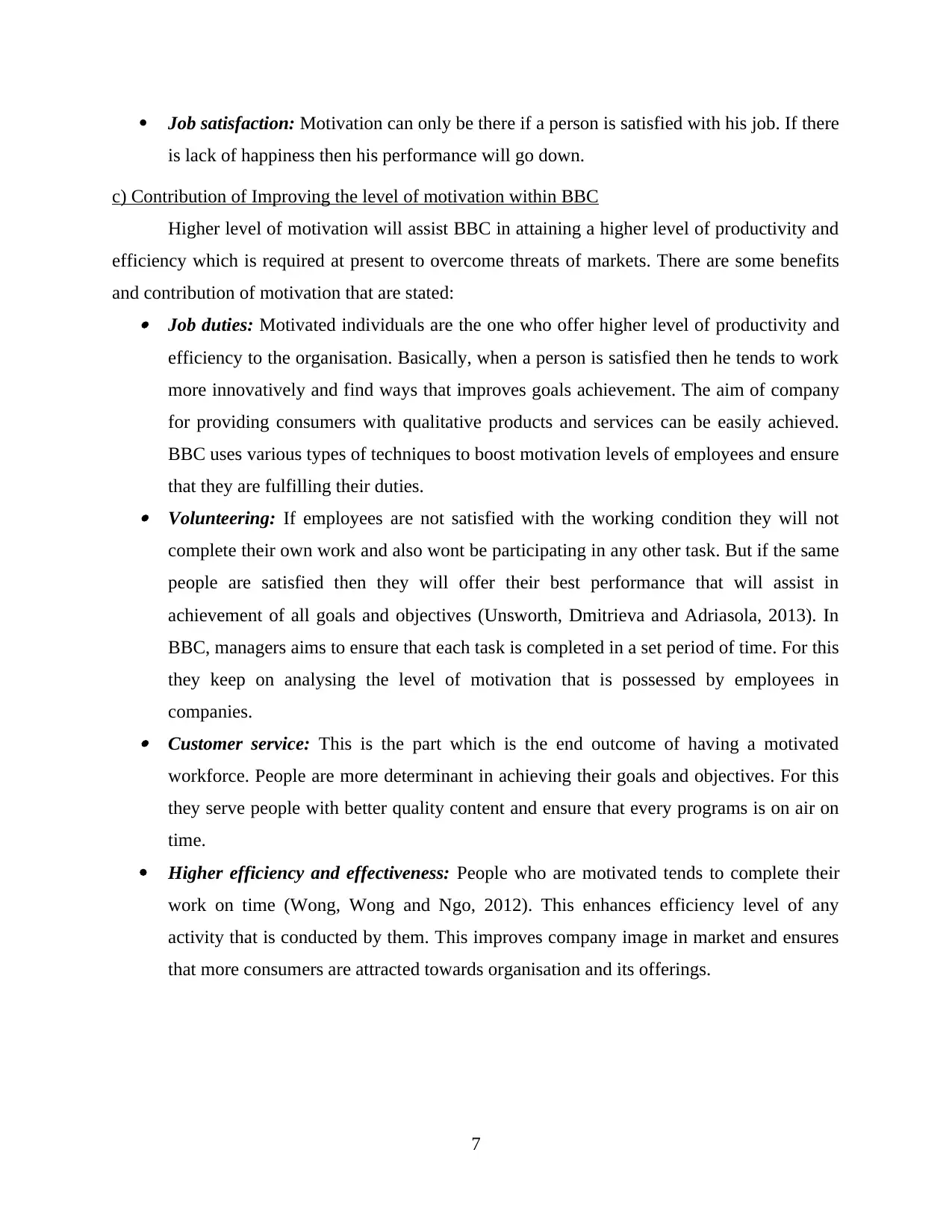
Job satisfaction: Motivation can only be there if a person is satisfied with his job. If there
is lack of happiness then his performance will go down.
c) Contribution of Improving the level of motivation within BBC
Higher level of motivation will assist BBC in attaining a higher level of productivity and
efficiency which is required at present to overcome threats of markets. There are some benefits
and contribution of motivation that are stated: Job duties: Motivated individuals are the one who offer higher level of productivity and
efficiency to the organisation. Basically, when a person is satisfied then he tends to work
more innovatively and find ways that improves goals achievement. The aim of company
for providing consumers with qualitative products and services can be easily achieved.
BBC uses various types of techniques to boost motivation levels of employees and ensure
that they are fulfilling their duties. Volunteering: If employees are not satisfied with the working condition they will not
complete their own work and also wont be participating in any other task. But if the same
people are satisfied then they will offer their best performance that will assist in
achievement of all goals and objectives (Unsworth, Dmitrieva and Adriasola, 2013). In
BBC, managers aims to ensure that each task is completed in a set period of time. For this
they keep on analysing the level of motivation that is possessed by employees in
companies. Customer service: This is the part which is the end outcome of having a motivated
workforce. People are more determinant in achieving their goals and objectives. For this
they serve people with better quality content and ensure that every programs is on air on
time.
Higher efficiency and effectiveness: People who are motivated tends to complete their
work on time (Wong, Wong and Ngo, 2012). This enhances efficiency level of any
activity that is conducted by them. This improves company image in market and ensures
that more consumers are attracted towards organisation and its offerings.
7
is lack of happiness then his performance will go down.
c) Contribution of Improving the level of motivation within BBC
Higher level of motivation will assist BBC in attaining a higher level of productivity and
efficiency which is required at present to overcome threats of markets. There are some benefits
and contribution of motivation that are stated: Job duties: Motivated individuals are the one who offer higher level of productivity and
efficiency to the organisation. Basically, when a person is satisfied then he tends to work
more innovatively and find ways that improves goals achievement. The aim of company
for providing consumers with qualitative products and services can be easily achieved.
BBC uses various types of techniques to boost motivation levels of employees and ensure
that they are fulfilling their duties. Volunteering: If employees are not satisfied with the working condition they will not
complete their own work and also wont be participating in any other task. But if the same
people are satisfied then they will offer their best performance that will assist in
achievement of all goals and objectives (Unsworth, Dmitrieva and Adriasola, 2013). In
BBC, managers aims to ensure that each task is completed in a set period of time. For this
they keep on analysing the level of motivation that is possessed by employees in
companies. Customer service: This is the part which is the end outcome of having a motivated
workforce. People are more determinant in achieving their goals and objectives. For this
they serve people with better quality content and ensure that every programs is on air on
time.
Higher efficiency and effectiveness: People who are motivated tends to complete their
work on time (Wong, Wong and Ngo, 2012). This enhances efficiency level of any
activity that is conducted by them. This improves company image in market and ensures
that more consumers are attracted towards organisation and its offerings.
7
Paraphrase This Document
Need a fresh take? Get an instant paraphrase of this document with our AI Paraphraser
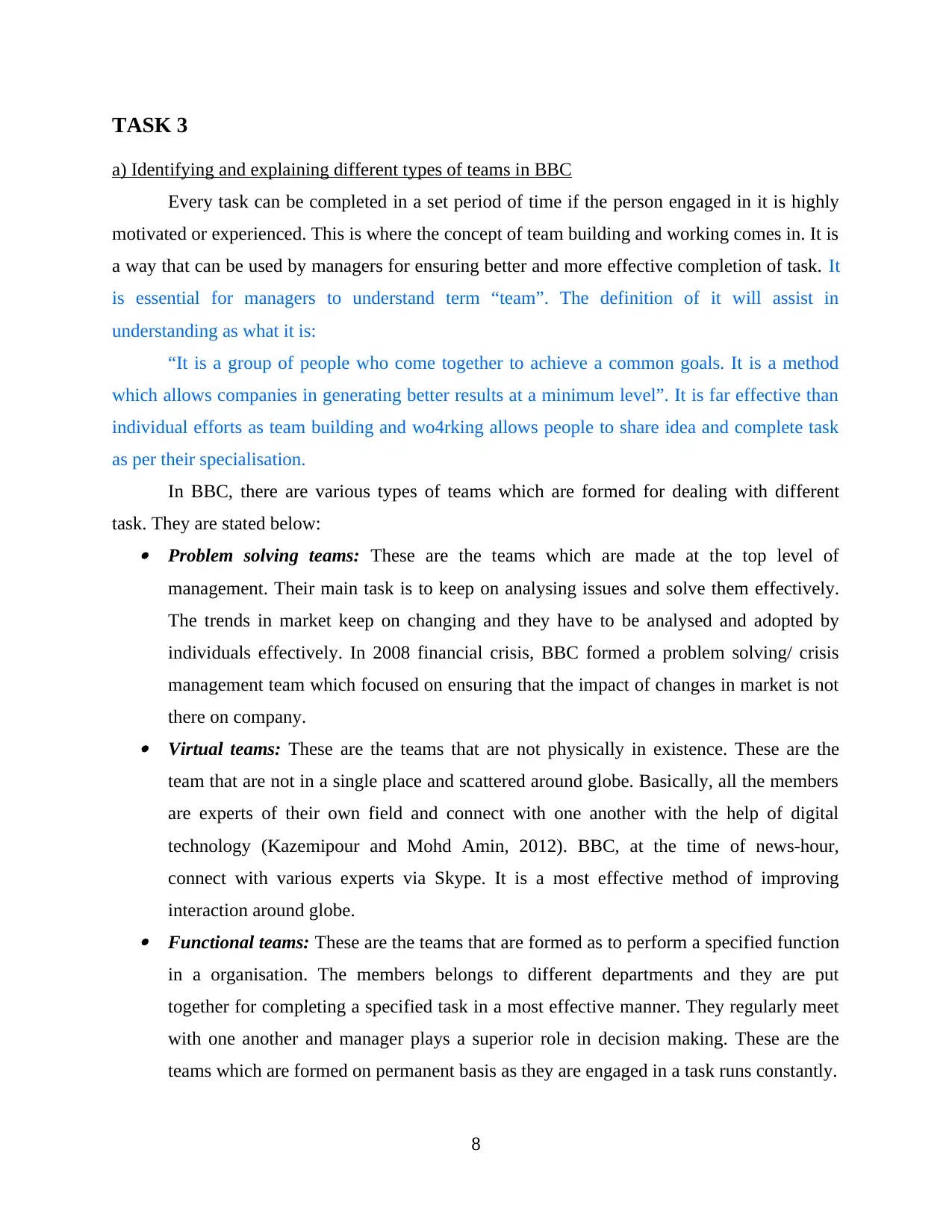
TASK 3
a) Identifying and explaining different types of teams in BBC
Every task can be completed in a set period of time if the person engaged in it is highly
motivated or experienced. This is where the concept of team building and working comes in. It is
a way that can be used by managers for ensuring better and more effective completion of task. It
is essential for managers to understand term “team”. The definition of it will assist in
understanding as what it is:
“It is a group of people who come together to achieve a common goals. It is a method
which allows companies in generating better results at a minimum level”. It is far effective than
individual efforts as team building and wo4rking allows people to share idea and complete task
as per their specialisation.
In BBC, there are various types of teams which are formed for dealing with different
task. They are stated below: Problem solving teams: These are the teams which are made at the top level of
management. Their main task is to keep on analysing issues and solve them effectively.
The trends in market keep on changing and they have to be analysed and adopted by
individuals effectively. In 2008 financial crisis, BBC formed a problem solving/ crisis
management team which focused on ensuring that the impact of changes in market is not
there on company. Virtual teams: These are the teams that are not physically in existence. These are the
team that are not in a single place and scattered around globe. Basically, all the members
are experts of their own field and connect with one another with the help of digital
technology (Kazemipour and Mohd Amin, 2012). BBC, at the time of news-hour,
connect with various experts via Skype. It is a most effective method of improving
interaction around globe. Functional teams: These are the teams that are formed as to perform a specified function
in a organisation. The members belongs to different departments and they are put
together for completing a specified task in a most effective manner. They regularly meet
with one another and manager plays a superior role in decision making. These are the
teams which are formed on permanent basis as they are engaged in a task runs constantly.
8
a) Identifying and explaining different types of teams in BBC
Every task can be completed in a set period of time if the person engaged in it is highly
motivated or experienced. This is where the concept of team building and working comes in. It is
a way that can be used by managers for ensuring better and more effective completion of task. It
is essential for managers to understand term “team”. The definition of it will assist in
understanding as what it is:
“It is a group of people who come together to achieve a common goals. It is a method
which allows companies in generating better results at a minimum level”. It is far effective than
individual efforts as team building and wo4rking allows people to share idea and complete task
as per their specialisation.
In BBC, there are various types of teams which are formed for dealing with different
task. They are stated below: Problem solving teams: These are the teams which are made at the top level of
management. Their main task is to keep on analysing issues and solve them effectively.
The trends in market keep on changing and they have to be analysed and adopted by
individuals effectively. In 2008 financial crisis, BBC formed a problem solving/ crisis
management team which focused on ensuring that the impact of changes in market is not
there on company. Virtual teams: These are the teams that are not physically in existence. These are the
team that are not in a single place and scattered around globe. Basically, all the members
are experts of their own field and connect with one another with the help of digital
technology (Kazemipour and Mohd Amin, 2012). BBC, at the time of news-hour,
connect with various experts via Skype. It is a most effective method of improving
interaction around globe. Functional teams: These are the teams that are formed as to perform a specified function
in a organisation. The members belongs to different departments and they are put
together for completing a specified task in a most effective manner. They regularly meet
with one another and manager plays a superior role in decision making. These are the
teams which are formed on permanent basis as they are engaged in a task runs constantly.
8
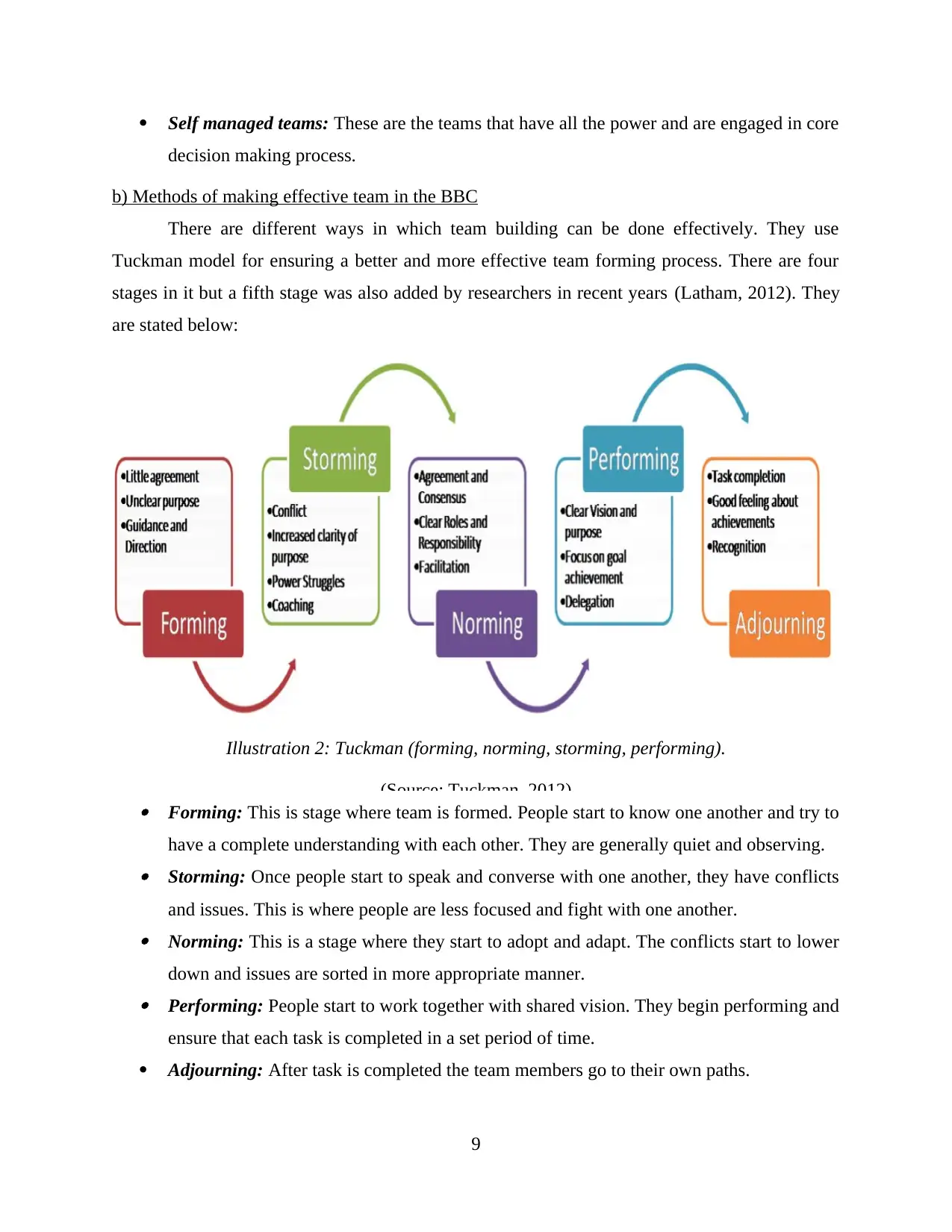
Self managed teams: These are the teams that have all the power and are engaged in core
decision making process.
b) Methods of making effective team in the BBC
There are different ways in which team building can be done effectively. They use
Tuckman model for ensuring a better and more effective team forming process. There are four
stages in it but a fifth stage was also added by researchers in recent years (Latham, 2012). They
are stated below:
Illustration 2: Tuckman (forming, norming, storming, performing).
(Source: Tuckman, 2012)
Forming: This is stage where team is formed. People start to know one another and try to
have a complete understanding with each other. They are generally quiet and observing. Storming: Once people start to speak and converse with one another, they have conflicts
and issues. This is where people are less focused and fight with one another. Norming: This is a stage where they start to adopt and adapt. The conflicts start to lower
down and issues are sorted in more appropriate manner. Performing: People start to work together with shared vision. They begin performing and
ensure that each task is completed in a set period of time.
Adjourning: After task is completed the team members go to their own paths.
9
decision making process.
b) Methods of making effective team in the BBC
There are different ways in which team building can be done effectively. They use
Tuckman model for ensuring a better and more effective team forming process. There are four
stages in it but a fifth stage was also added by researchers in recent years (Latham, 2012). They
are stated below:
Illustration 2: Tuckman (forming, norming, storming, performing).
(Source: Tuckman, 2012)
Forming: This is stage where team is formed. People start to know one another and try to
have a complete understanding with each other. They are generally quiet and observing. Storming: Once people start to speak and converse with one another, they have conflicts
and issues. This is where people are less focused and fight with one another. Norming: This is a stage where they start to adopt and adapt. The conflicts start to lower
down and issues are sorted in more appropriate manner. Performing: People start to work together with shared vision. They begin performing and
ensure that each task is completed in a set period of time.
Adjourning: After task is completed the team members go to their own paths.
9
⊘ This is a preview!⊘
Do you want full access?
Subscribe today to unlock all pages.

Trusted by 1+ million students worldwide
1 out of 17
Related Documents
Your All-in-One AI-Powered Toolkit for Academic Success.
+13062052269
info@desklib.com
Available 24*7 on WhatsApp / Email
![[object Object]](/_next/static/media/star-bottom.7253800d.svg)
Unlock your academic potential
Copyright © 2020–2025 A2Z Services. All Rights Reserved. Developed and managed by ZUCOL.





